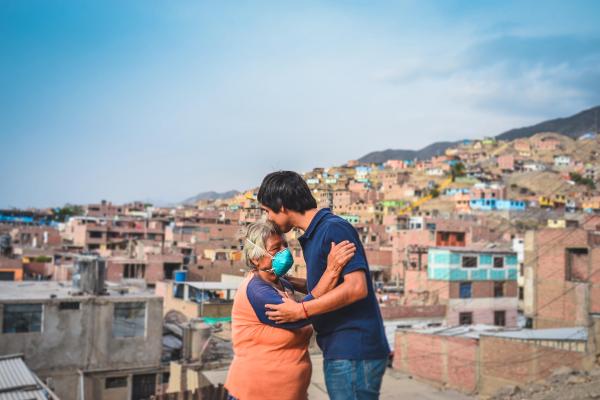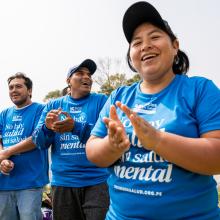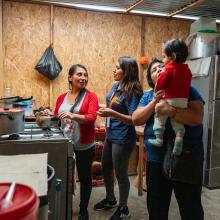Paul Farmer, founder of Partners In Health (PIH), defined accompaniment as “going with someone, sharing their destiny for a time… until the accompaniment is completed according to the one who receives it, not the one who gives it”.
In essence, accompaniment means being present on the journey, from the beginning to the end. It is more than solving problems; it is about building a relationship based on solidarity, respect and commitment to those who need it most.
That is why, in the following paragraphs, we tell you how accompaniment is put into practice at Socios En Salud and how, through our efforts, we are managing to positively impact the lives of thousands of people in vulnerable situations.
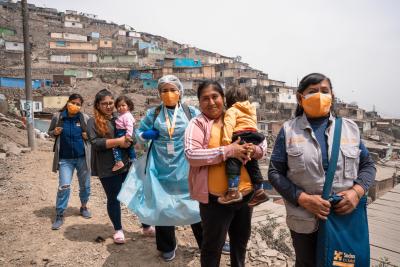
El acompañamiento es crucial para reducir las desigualdades en salud. Permite que las personas más vulnerables reciban atención médica oportuna, sin barreras económicas ni sociales.
Foto de SES
What are we talking about when we talk about accompaniment?
In Peru, thousands of people live on less than $2.30 a day. That means that, if they get sick, they will have to choose between their health and their survival. Between buying medicine or taking a loaf of bread home.
What options do these people have when the healthcare system is inaccessible?
Accompaniment emerges as a comprehensive response to these realities. An approach that Socios En Salud (SES) has turned into a model of care thanks to its community health agents, who voluntarily accompany the people who need it most.
Accompaniment not only connects people with the health system, but also empowers them. By involving community members and respecting their realities, SES offers tailored solutions that overcome existing economic and social barriers.
This comprehensive model involves much more than medical care. It includes social, educational and psychological support, and seeks to ensure that people receive adequate care, regardless of their economic condition or their ability to access the resources of the traditional healthcare system.
“To accompany someone is to go with that person somewhere, to break bread, to be present on a journey with a beginning and an end…. Accompaniment involves staying with a task until the one who receives it considers it complete, not the one who accompanies,” said Paul Farmer.
What types of accompaniment exist and how does Socios En Salud apply them?
Community accompaniment
Trained community health agents act as guides and allies to communities. Their work ranges from educating about healthy habits to ensuring that patients can keep their medical appointments.
In the last year alone, 11,212 people were accompanied by a Socios En Salud community agent. An action that has contributed to strengthening the continuity of treatment.
Clinical accompaniment
Includes financial support to cover treatments, laboratory tests and other essential medical services. This approach ensures that the most vulnerable people do not face financial barriers in their pursuit of health.
Thus, also in the last year, Socios En Salud provided 342 medical care services to vulnerable people and managed 1,518 diagnostic imaging tests.
Social accompaniment
Addresses the bureaucratic and social challenges that hinder access to the health system. This includes helping people without documents, those facing discrimination, or those who need to cover services such as housing or transportation to access specific benefits.
Between 2023 and 2024, 552 people have received social support from Socios En Salud. In this way, it seeks to ensure that no one is excluded from the health system for administrative or social reasons.
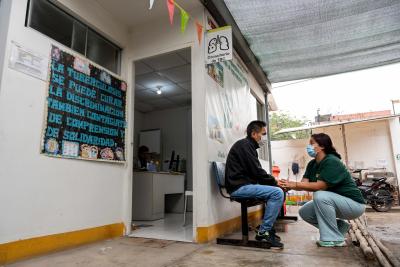
El acompañamiento no solo conecta a las personas con el sistema de salud, sino también las empodera.
Foto de SES
Why is it important to promote accompaniment?
Accompaniment is crucial to reduce health inequalities. It allows the most vulnerable people to receive timely medical care, without economic or social barriers.
Promoting accompaniment means recognizing that health is a human right rather than a privilege. Addressing structural inequalities allows each person to receive the support they need to access quality health services.
Coaching has a direct impact on people’s quality of life. Offering continuous support improves adherence to treatments, favors prevention and promotes health education, empowering people to make informed decisions.
When working as a team, we accompany not only the patient, but also his or her community. We strengthen the surrounding social network and create a supportive environment that promotes collective well-being. It is a comprehensive and sustainable health strategy.
Your donation makes a difference. Contribute and help us bring the cure against social injustice to more communities.
